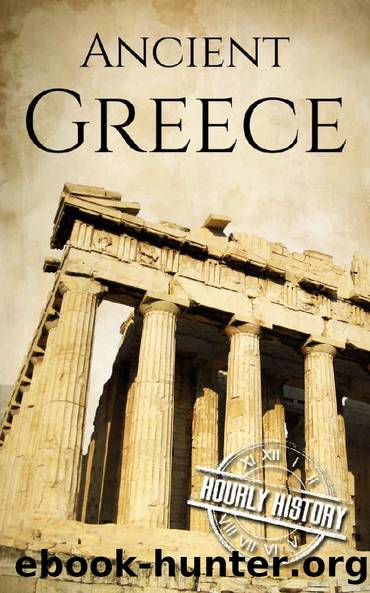Ancient Greece: A History From Beginning to End (Ancient Civilizations Book 3) by Hourly History

Author:Hourly History [History, Hourly]
Language: eng
Format: epub
Publisher: Hourly History
Published: 2017-05-30T00:00:00+00:00
Chapter Five
Philosophy
âNothing exists except atoms and empty space; everything else is opinion.â
âDemocritus
Philosophy is the study of fundamental life issues, like the meaning of existence, logic, reason, and modes of thought. The very word philosophy is based on the Greek words meaning âlove of wisdom.â The modern disciplines of metaphysics, ethics, and epistemology are examples of philosophical pursuits.
Thales, who is often credited as the first philosopher in the Western world, stands at the beginning of a long tradition leading to Stoics and Skeptics, and other schools of thought. These traditions of ancient Greek philosophy gave us a framework and language to speak about knowledge itself. This was the beginning of the historical, intellectual tradition in the West.
Traditionally, there has been a desire for a life of rational thought. This desire to make sense out of the world in a way that was more comprehensible and predictable than the whims of the gods would eventually lead to the scientific discoveries of today. For example, Democritus believed in the existence of the atom as the invisible building block of the material world, thousands of years before modern scientists developed linear particle accelerators to explore subatomic particles. Socrates brought a debate about what entailed a good life, and the purpose of our lives. Platoâs Atlantis was a vision of an advanced society that once had existed; a lost world of prosperity and enlightenment, swallowed by the sea as punishment for prideful behavior. Explorers are still searching for the site of the mythic drowned civilization in waters around the world.
Platoâs student, Aristotle, is one of our richest sources regarding ancient philosophical ideas. He wrote treatises on issues like the investigation of the natural world, basic biology, and zoology. His Republic is a pioneering text of societal development that echoes in modern politics.
More philosophical movements were developed by various groups, including the Epicureans, the Cynics, the Stoics, and the Skeptics. The lifestyle recommendations espoused by these groups are still a part of our vocabulary today. People are skeptical, cynical, self-indulgent like the Epicureans, or strictly unaffected like the Stoics. These labels and terms we use to describe ourselves and our outlook on life were first envisioned by the great thinkers of ancient Greece.
New ways of thinking take time to be accepted. Traditions and comfortable views take time to change. Unsurprisingly, the philosophers who criticized established thought patterns came into conflict with authorities often. Socrates was put to death for his so-called heresies against the gods. Aristotle only narrowly escaped execution himself by fleeing Athens. In spite of the persecution, new ways of thinking continued to push the boundaries of convention, a trend that we can easily see still carries on every day.
Download
This site does not store any files on its server. We only index and link to content provided by other sites. Please contact the content providers to delete copyright contents if any and email us, we'll remove relevant links or contents immediately.
Blood and Oil by Bradley Hope(1259)
Daniel Holmes: A Memoir From Malta's Prison: From a cage, on a rock, in a puddle... by Daniel Holmes(1125)
Ambition and Desire: The Dangerous Life of Josephine Bonaparte by Kate Williams(1096)
Wandering in Strange Lands by Morgan Jerkins(1023)
It Was All a Lie by Stuart Stevens;(949)
What Really Happened: The Death of Hitler by Robert J. Hutchinson(878)
London in the Twentieth Century by Jerry White(855)
Time of the Magicians by Wolfram Eilenberger(849)
Twilight of the Gods by Ian W. Toll(820)
The First Conspiracy by Brad Meltzer & Josh Mensch(817)
The Japanese by Christopher Harding(808)
A Woman by Sibilla Aleramo(804)
Lenin: A Biography by Robert Service(786)
The Devil You Know by Charles M. Blow(785)
Reading for Life by Philip Davis(782)
Cleopatra by Alberto Angela(773)
Twelve Caesars by Mary Beard(773)
The Life of William Faulkner by Carl Rollyson(720)
1965--The Most Revolutionary Year in Music by Andrew Grant Jackson(719)
